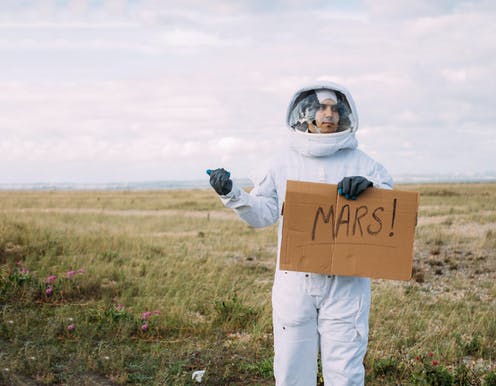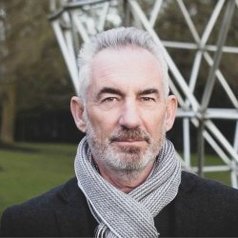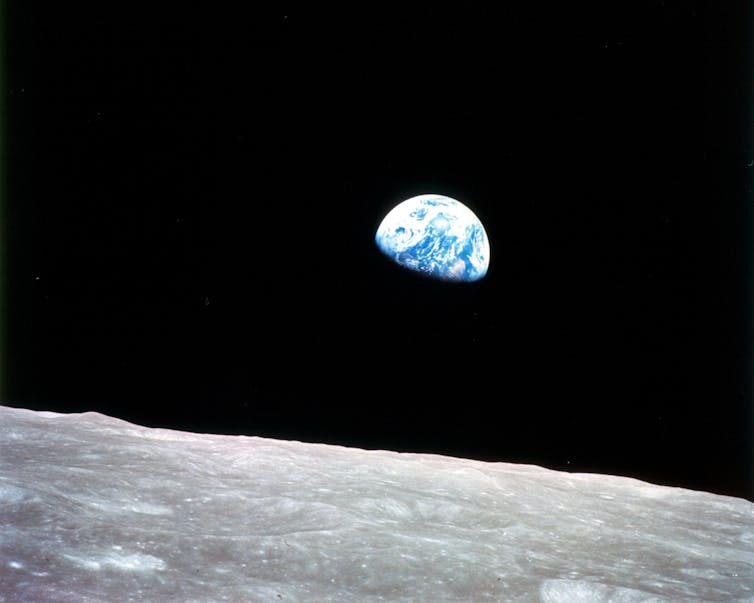Mars ain’t the kind of place to raise your kids, laments the Rocket Man in Elton John’s timeless classic. In fact, it’s cold as hell. But that doesn’t seem to worry a new generation of space entrepreneurs intent on colonising the “final frontier” as fast as possible.
Don’t get me wrong. I’m no sullen technophobe. As lockdown projects go, NASA’s landing of the Perseverance rover on the surface of the red planet earlier this year was a hell of a blast. Watching it reminded me that I once led a high school debate defending the motion: this house believes that humanity should reach for the stars.
It must have been around the time that Caspar Weinberger was trying to persuade President Nixon not to cancel the Apollo space programme. My brothers and I had watched the monochrome triumph of the Apollo 11 landing avidly in 1969. We’d witnessed the near disaster of Apollo 13 – immortalised in a 1995 Hollywood film – when Jim Lovell (played by Tom Hanks) and two rookie astronauts narrowly escaped with their lives by using the Lunar Module as an emergency life raft. We knew it was exciting up there.
I remember later going to see Apollo 13 (the film) with a friend who wasn’t born when the mission itself took place. “What did you think?” I asked as we came out of the cinema. “It was OK,” said my friend. “Just not very believable.”
But we kids were glued to our black and white TV sets the entire week of the original mission. We watched in horror as CO₂ levels rose in the Lunar Module. We endured the endless blackout as the returning astronauts plunged perilously back to Earth. We held our breath with the rest of the world as the expected four minutes stretched to five and hope began to fade. It was a full six minutes before the camera finally came into focus on the command module’s parachutes – safely deployed above the Pacific Ocean. We felt the endorphin rush. We knew it was believable.
That was 1970. This is now. And here I am again on the edge of another sofa, in the lingering uncertainty of the time of COVID-19, waiting for signs of arrival from another re-entry blackout on another barren rock, devoid of breathable atmosphere, 200 million miles away. And when the Perseverance Rover finally touches down on the surface of Mars: that same exhilaration. That same endorphin rush. Quite difficult to witness the jubilation behind the masks at NASA’s mission control without feeling a glimmer of vicarious joy. Hope, even.
But NASA’s clever science experiment is just the tip of an expansionary iceberg. A teaser, if you will, for an ambitious dream that is being driven faster and faster by huge commercial interests. A curious twist in a debate that has been raging now for almost half a century.
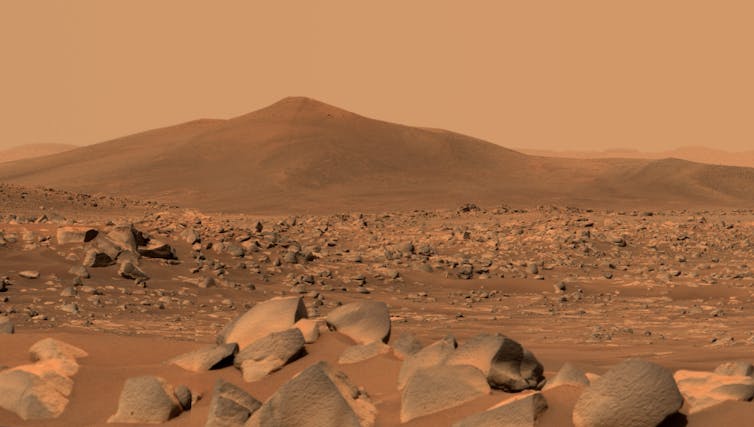
NASA’s Perseverance Mars rover used its dual-camera Mastcam-Z imager to capture this image. a hill about 2.5km away. NASA/JPL-Caltech/ASU/MSSS
Growth wars
Ever since 1972, when a team of MIT scientists published a massively influential report on the Limits to Growth, economists have been fighting about whether it’s possible for the economy to expand forever. Those who believe it can, appeal to the power of technology to “decouple” economic activity from its impacts on the planet. Those (like me) who believe it can’t point to the limited evidence for decoupling at anything like the pace that’s needed to avoid a climate emergency or prevent a catastrophic decline in biodiversity.
The growth debate often hangs on the power you attribute to technology to save us. Usually it’s the technophiles arguing for infinite growth on a finite planet – sometimes putting their hopes in speculative technologies such as direct air capture or dangerous ones like nuclear power. And usually it’s the sceptics arguing for a post-growth economy. But the simple division between technophiles and technophobes has never been particularly helpful. Very few growth sceptics reject technology completely. No one at all is asking humanity to return to the cave.
My own research teams at the University of Surrey have been exploring the vital role of sustainable technology in transforming the economy for almost three decades now. But we’ve also shown how the dynamics of capitalism – in particular its relentless pursuit of productivity growth – continually push society towards materialistic goals, and undermine those parts of the economy such as care, craft and creativity, which are essential to our quality of life.
And now suddenly, along comes a group of self-confessed technology lovers finally admitting that the planet is too small for us. Yes, you were right, they imply: the Earth cannot sustain infinite growth. That’s why we have to expand into space.
Wait. What just happened? Did somebody move the goalposts? Something is wrong. Maybe it’s me. One thing I know for sure. I’m no longer the same kid I was – the one from the debating society. This house believes that humanity should grow the fuck up.
Before it spends trillions of dollars littering its techno-junk around the solar system, this house believes that humanity should pay a little more attention to what’s happening right here and now. On this planet.
The human condition
Perhaps ironically, it was from space that we saw it first. In October 1957, the Soviets sent an unmanned orbital satellite called Sputnik into space. It was one of those odd moments in history (like the coronavirus) that dramatically reshapes our social world. Sputnik kicked off the space race, intensified the arms race and heightened the Cold War. It was a huge blow to US self-esteem not to be the first nation to reach space and it was the jolt it used to kickstart the Apollo Moon shot. No one likes coming second. Least of all the most powerful people on the planet.
But Sputnik also signalled the beginning of a new relationship between humanity and its earthly home. As the political philosopher Hannah Arendt remarked in the prologue to her 1958 masterpiece, The Human Condition, going into space allowed us to grasp our planetary predicament for the first time in history. It was a reminder that “the Earth is the quintessence of the human condition”. And nature itself, “for all we know, may be unique in providing human beings with a habitat in which they can move and breathe without effort and without artifice”.
Fair point. And nothing we’ve learned in the intervening years has changed that prognosis. Mars may be the most habitable planet in the solar system, outside our own. But it’s still a very far cry from the beauty of home – whose fragility we only truly learned to appreciate fully from the images sent back to us from space.
Earthrise. Nasa
Nature photographer Galen Rowell once called William Anders’ iconic photo Earthrise – taken from the Apollo 8 module in lunar orbit – “the most influential environmental photograph ever taken”. Earthrise brought home to us, in one astonishing image, the stark reality that this shining orb was – and still is – humanity’s best chance for anything that might meaningfully be called the “good life”.
Its beauty is our beauty. Its fragility is our fragility. And its peril is our peril.
An inconvenient truth
In the very same year that Arendt published The Human Condition, a Shell executive named Charles Jones presented a paper to the fossil fuel industry’s trade group, the American Petroleum Institute, warning of the impact of carbon emissions from fossil fuel combustion on the atmosphere. It was early evidence of climate change.
It was also evidence, according to lawsuits now being filed by cities and states in the US, that companies like Shell knew it was happening more than 60 years ago – three decades before James Hansen’s scientific testimony to Congress in 1988 brought global warming to public attention. And they did nothing about it. Worse, argue plaintiffs like the state of Delaware, they lied over and again to cover up this “inconvenient truth”.
Why such a thing could happen is now clear. Evidence of their impact was a direct threat to the profits of some of the most powerful corporations on the planet. Profit is the bedrock of capitalism. And as I argue in my new book, we have allowed capitalism to trump everything: work, life, hope – even good governance. The most enlightened governments in the world have turned a blind eye to the need for urgent action. Now we’re on the verge of being too late to fix it. Achieving net zero by 2050 is no longer enough. We need much more, much faster to avoid ending up in an unliveable hothouse.
Even as I write, record-breaking temperatures, 10-20℃ above the seasonal average, have forced citizens on the west coast of North America into underground shelters to avoid the searing heat. Wildfires are raging in California’s Death Valley, where temperatures have reached an astonishing 54℃. On the storm-struck east coast, flood waters have inundated the New York subway system. Thousands remain homeless and hundreds are still missing, meanwhile, as historic flooding across central Europe has left almost 200 people dead.
In the face of the blindingly obvious, even recalcitrant presidents and politicians are at last beginning to acknowledge the scale of the peril in which our relentless pursuit of economic growth has placed the planet. And in principle they still have time to do something about it.
As I and many colleagues have argued, the pandemic offers us a unique opportunity to fashion a different kind of economy. The 26th Conference of the Parties to the UN Climate Change Convention (COP26) in Glasgow in November 2021 could well be the place to do that. Whether that happens or not will depend as much on vision as it does on science. And on our courage to confront the inequalities of power that led us to this point.
It will also depend on us going back to first principles and asking ourselves: how exactly should we aim to live in the only habitable world in the known universe? What is the nature of the good life available to us here? What can prosperity possibly mean for a promiscuous species on a finite planet?
The question is almost as old as the hills. But the contemporary answer to it is paralysingly narrow. Cast in the garb of late capitalism, prosperity has been captured by the ideology of “growth at all costs”: an insistence that more is always better. Despite overwhelming evidence that relentless expansion is undermining nature and driving us towards a devastating climate emergency, the “fairytales of eternal growth” still reign supreme.

Shouldn’t humanity focus on shoring up the good life on Earth before we race off into space? Tegan Mierle/Unsplash, FAL
Zero gravity
It’s an ironic twist in the tale of the debate society kid I used to be that I’ve spent most of my professional life confronting those fairytales of growth. Don’t ask me how that happened. By accident mostly.
I toyed with the idea of studying astrophysics. But I ended up studying Maths at Cambridge, where I confess to being baffled by the complexity of it all, until I realised that even math is just a trick. Quite literally a formula. Believe in it and you can travel to the stars and back. In your mind, at least.
And there I was wandering around in zero G, when I woke up one day (in April 1986) to find that the Number four reactor at the Chernobyl nuclear power plant in the Ukraine had suffered a catastrophic meltdown. I suddenly realised that the very same skills I’d spent my life developing were leading humanity not towards the stars but away from the paradise we already inhabit.
So yes. I changed my mind. The next day I walked into the Greenpeace office in London and asked what I could do to help. They set me working on the economics of renewable energy I became, accidentally, an economist. (Economics needs more accidental economists.) And that’s when it began to dawn on me that learning how to live well on this fragile planet is far more important than dreaming about the next one.
Mine is bigger than yours
Not so the space race billionaires. A handful of unbelievably powerful men, whose wealth has exploded massively throughout the pandemic, are now busy trying to persuade us that the future lies not here on Earth but out there among the stars.
Tesla founder and serial entrepreneur, Elon Musk is one of these new rocket men. “Those who attack space,” he tweeted recently, “maybe don’t realise that space represents hope for so many people”. That may be true of course in a world where huge inequalities of wealth and privilege strip hope from the lives of billions of people. But, as the spouse of a Nasa flight controller pointed out, it obscures the extraordinary demands of escaping from Mother Earth, in terms of energy materials, people and time.
Undeterred, the rocket men gaze starward. If resources are the problem, then space must be the answer. Amazon founder Jeff Bezos is pretty explicit about his own expansionary vision. “We can have a trillion humans in the solar system,” he once declared. “Which means we’d have a thousand Mozarts and a thousand Einsteins. This would be an incredible civilisation.”
Bezos and Musk have spent their lockdown contesting the top two places on the Forbes rich list. They’ve also been playing “mine is bigger than yours” in their own private space race for a couple of decades now. Bezos’s personal wealth almost doubled during the course of a pandemic that destroyed the lives and livelihoods of millions. He’s now stepping down to spend more time on Blue Origin, the company he hopes will deliver vast human colonies across the solar system.
The declared aim of Musk’s rival company, SpaceX, is “to make humanity multiplanetary”. Just like Kim Stanley Robinson’s science fiction trilogy back in the 1990s, Musk aims to establish a permanent human colony on Mars. To get there, he reasons, we need very big rockets – or, in the original terminology of SpaceX, Big Fucking Rockets (BFRs) – eventually capable of transporting scores of people and hundreds of tonnes of equipment millions of miles across the solar system.
The BFRs have now given way to a series of (more sedately named) Starships. And to prove his green credentials Musk desperately wants these starships to be reusable. So much so that SpaceX conspired to blow up four consecutive Starship prototypes in quick succession during the first four months of 2021 trying unsuccessfully to re-land them.
Move fast and break things is the Silicon Valley motto of course. But eventually you’ve got to bring the goods home. Starship SN15 finally achieved that on May 5 – three weeks after SpaceX had landed a massive US$2.9 billion contract from NASA, nudging Blue Origin into the space race shadows.
Not wanting to be outdone, Bezos came up with what he must have hoped was the ultimate comeback. When Blue Origin’s New Shepard rocket – which is also reusable – made its first manned space flight on July 20, he and his brother Mark would be two of the first few passengers on board. Wow, Jeff! Kudos man! Now you really show us your cojones! Nobody likes coming second. Least of all the most powerful people on the planet.
But sometimes you get no choice. Out of the blue, without so much as a by-your-leave, Virgin boss, Richard Branson swooped in to steal everyone’s thunder. On July 11, nine days before Bezos’s big day, Branson became the first ever billionaire to launch himself into space.
And for a cool US$250,000, he promised us, you too can be one of Virgin Galactic’s 600 or so breathless customers, waiting to enjoy three or four weightless minutes gazing back in rapture at the planet you’ve left behind. Apparently, Musk has already signed up. Bezos doesn’t need to. He’s made his own virgin space flight now.
Prosperity as health
The space rhetoric of the super-rich betrays a mentality that may once have served humanity well. Some would say it’s a quintessential feature of capitalism. Innovation upon innovation. A driving ambition to expand and explore. A primal urge to escape our origins and reach for the next horizon. Space travel is a natural extension of our obsession with economic growth. It’s the crowning jewel of capitalism. Further and faster is its frontier creed.
I’ve spent much of my professional life as a critic of that creed, not just for environmental reasons but on social grounds as well. The seven years I spent as economics commissioner on the UK’s Sustainable Development Commission and my subsequent research at the Centre for the Understanding of Sustainable Prosperity revealed something fundamental about our aspirations for the good life. Something that has been underlined by the experience of the pandemic.
Prosperity is as much about health as it is about wealth. Ask people what matters most in their lives and the chances are that this will come out somewhere near the top of the list. Health for themselves. Health for their friends and their families. Health too – sometimes – for the fragile planet on which we live and on whose health we ourselves depend.
There’s something fascinating in this idea. Because it confronts the obsession with growth head on. As Aristotle pointed out in Nicomachean Ethics (a book named after his physician father), the good life is not a relentless search for more, but a continual process of finding a “virtuous” balance between too little and too much.
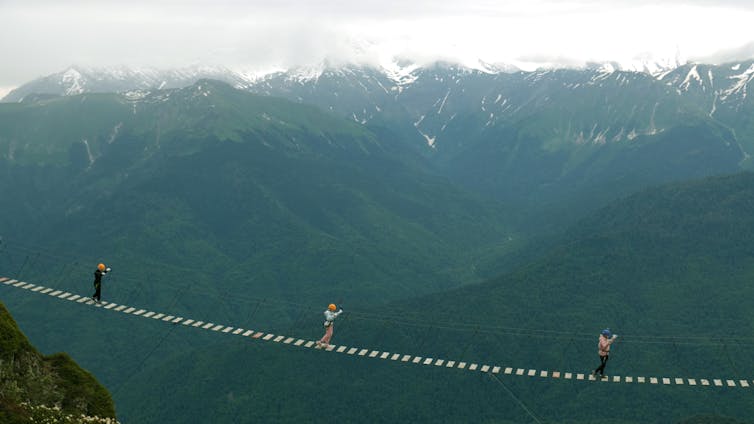
Prosperity requires a balancing act, not a race to the stars. JuliaStar/Shutterstock
Population health provides an obvious example of this idea. Too little food and we’re struggling with diseases of malnutrition. Too much and we’re tipped into the “diseases of affluence” that now kill more people than under-nutrition does. Good health depends on us finding and nurturing this balance.
This task is always tricky of course, even at the individual level. Just think about the challenge of keeping your exercise, your diet and your appetites in line with the outcome of a healthy body weight. But as I’ve argued, living inside a system that has its sights continually focused on more makes the task near impossible. Obesity has tripled since 1975. Almost two-fifths of adults over 18 are overweight. Capitalism not only fails to recognise the point where balance lies. It has absolutely no idea how to stop when it gets there.
You’d think our brush with mortality through the pandemic would have brought some of this home to us. You’d think it would give us pause for thought about what really matters to us: the kind of world we want for our children; the kind of society we want to live in. And for many people it has. In a survey carried out during lockdown in the UK, 85% of respondents found something in their changed conditions they felt worth keeping and fewer than 10% wanted a complete return to normal.
When life and health are at stake, the ungodly scramble for wealth and status feels less and less attractive. Even the lure of technology pales. Family, conviviality and a sense of purpose come to the fore. These are the things that many people found they lacked most throughout the pandemic. But their importance in our lives was not a COVID accident: they are the most fundamental elements of a sustainable prosperity.
The denial of death
Something even more surprising has emerged during my three decades of research. Behind consumer capitalism, behind the frontier mentality, beyond the urge to expand forever lies a deep-seated and pervasive anxiety.
What does day two look like, Bezos once asked a crowd of the faithful, referring to his famous maxim about the need to innovate. “Day two is stasis, followed by irrelevance, followed by excruciatingly painful decline, followed by death,” he said. “And that. Is why. It is always. Day one!” His audience loved it.
Musk plays out his own inner demons just as disarmingly. “I’m not trying to be anyone’s saviour,” he once told TED’s head curator, Chris Anderton. “I’m just trying to think about the future – and not be sad.” Again, the applause was deafening.
A well-trained therapist could have a field day with all of this. Take that miraculous day a few weeks after the Perseverance rover started sending home the most amazing selfies in the universe, when the Ingenuity helicopter made its virgin flight in the wafer thin atmosphere of Mars. It was the kind of outcome that could have intelligence agencies drooling over far less benign uses of the technology. But there was also something pretty existential going on.
The faint whispering of the Martian wind, relayed faithfully across the solar system, doesn’t just confirm the possibilities for aerial flight on an alien planet. It’s grist to the mill of an essential belief that human beings are endlessly creative and fiendishly clever.
Our visceral response to these momentary triumphs speaks to a branch of psychology called terror management theory drawn from the work of cultural anthropologist Ernest Becker. It was explored in particular in his astonishing 1973 book The Denial of Death. In it, Becker argues that modern society has lost its way, precisely because we’ve become terrified of confronting the inevitability of our own demise.
Terror management theory tells us that, when mortality becomes “salient”, instead of addressing the underlying fear, we turn for comfort to the things which make us feel good. Capitalism itself is a massive comfort blanket, designed to help us never confront the mortality that awaits us all. So too are the dreams of the rocket men.
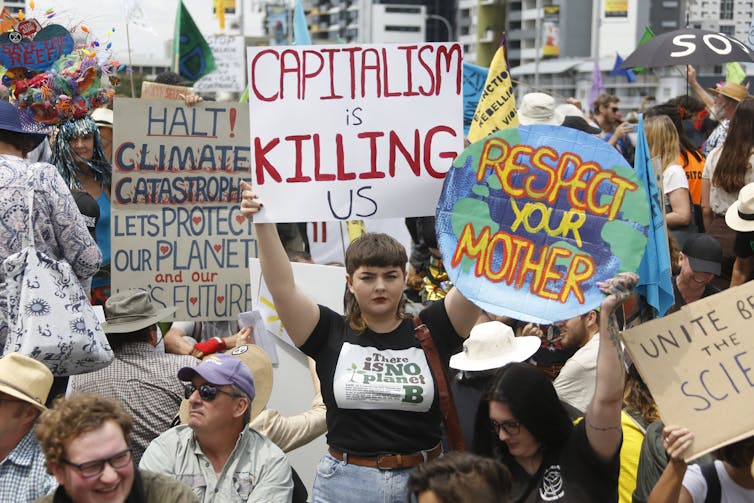
‘Capitalism is killing us’. Alex Bee/Shutterstock.com
Beyond lockdown
When Sputnik kickstarted the first “space race” six decades ago, a US newspaper headline called it “one step toward [our] escape from imprisonment to the Earth”. Arendt read those words with astonishment. She saw there a deep-seated “rebellion against human existence”. It isn’t just the pandemic that locks us down, the implication is. It’s the entire human condition.
The anxiety we feel is nothing new. The choice between confronting our fears and running away from them has always been a profound one. It’s exactly the choice we’re facing now. As vaccine roll-out brings a glimmer of light at the end of COVID-19, the temptation to rush into wild escapism is massive.
But for all its glamour, the “final frontier” is at best an amusement and at worst a fatal distraction from the urgent task of rebuilding a society ravaged by social injustice, climate change and a loss of faith in the future.
With most of us still reeling from what the World Health Organisation has called a shadow pandemic in mental health, any kind of escape plan at all looks remarkably like paradise. And emigrating to Mars is one hell of an escape plan.
Let’s dream of some “final frontier” by all means. But let’s focus our minds too on some quintessentially earthly priorities. Affordable healthcare. Decent homes for the poorest in society. A solid education for our kids. Reversing the decades-long precarity in the livelihoods of the frontline workers – the ones who saved our lives. Regenerating the devastating loss of the natural world. Replacing a frenetic consumerism with an economy of care and relationship and meaning.
Never have these things made so much sense to so many. Never has there been a better time to turn them into a reality. Not just for the handful of billionaires dreaming of unbridled wealth on the red planet, but for the eight billion mere mortals living out their far less brazen dreams on the blue one.



 Missouri Judge Dismisses Lawsuit Challenging Starbucks’ Diversity and Inclusion Policies
Missouri Judge Dismisses Lawsuit Challenging Starbucks’ Diversity and Inclusion Policies  TSMC Eyes 3nm Chip Production in Japan with $17 Billion Kumamoto Investment
TSMC Eyes 3nm Chip Production in Japan with $17 Billion Kumamoto Investment  Sony Q3 Profit Jumps on Gaming and Image Sensors, Full-Year Outlook Raised
Sony Q3 Profit Jumps on Gaming and Image Sensors, Full-Year Outlook Raised  Nvidia CEO Jensen Huang Says AI Investment Boom Is Just Beginning as NVDA Shares Surge
Nvidia CEO Jensen Huang Says AI Investment Boom Is Just Beginning as NVDA Shares Surge  Nvidia, ByteDance, and the U.S.-China AI Chip Standoff Over H200 Exports
Nvidia, ByteDance, and the U.S.-China AI Chip Standoff Over H200 Exports  SoftBank Shares Slide After Arm Earnings Miss Fuels Tech Stock Sell-Off
SoftBank Shares Slide After Arm Earnings Miss Fuels Tech Stock Sell-Off  Ford and Geely Explore Strategic Manufacturing Partnership in Europe
Ford and Geely Explore Strategic Manufacturing Partnership in Europe  Washington Post Publisher Will Lewis Steps Down After Layoffs
Washington Post Publisher Will Lewis Steps Down After Layoffs  Hims & Hers Halts Compounded Semaglutide Pill After FDA Warning
Hims & Hers Halts Compounded Semaglutide Pill After FDA Warning  Instagram Outage Disrupts Thousands of U.S. Users
Instagram Outage Disrupts Thousands of U.S. Users  SpaceX Prioritizes Moon Mission Before Mars as Starship Development Accelerates
SpaceX Prioritizes Moon Mission Before Mars as Starship Development Accelerates  Baidu Approves $5 Billion Share Buyback and Plans First-Ever Dividend in 2026
Baidu Approves $5 Billion Share Buyback and Plans First-Ever Dividend in 2026  Once Upon a Farm Raises Nearly $198 Million in IPO, Valued at Over $724 Million
Once Upon a Farm Raises Nearly $198 Million in IPO, Valued at Over $724 Million  Weight-Loss Drug Ads Take Over the Super Bowl as Pharma Embraces Direct-to-Consumer Marketing
Weight-Loss Drug Ads Take Over the Super Bowl as Pharma Embraces Direct-to-Consumer Marketing  Global PC Makers Eye Chinese Memory Chip Suppliers Amid Ongoing Supply Crunch
Global PC Makers Eye Chinese Memory Chip Suppliers Amid Ongoing Supply Crunch  Amazon Stock Rebounds After Earnings as $200B Capex Plan Sparks AI Spending Debate
Amazon Stock Rebounds After Earnings as $200B Capex Plan Sparks AI Spending Debate  Alphabet’s Massive AI Spending Surge Signals Confidence in Google’s Growth Engine
Alphabet’s Massive AI Spending Surge Signals Confidence in Google’s Growth Engine 










